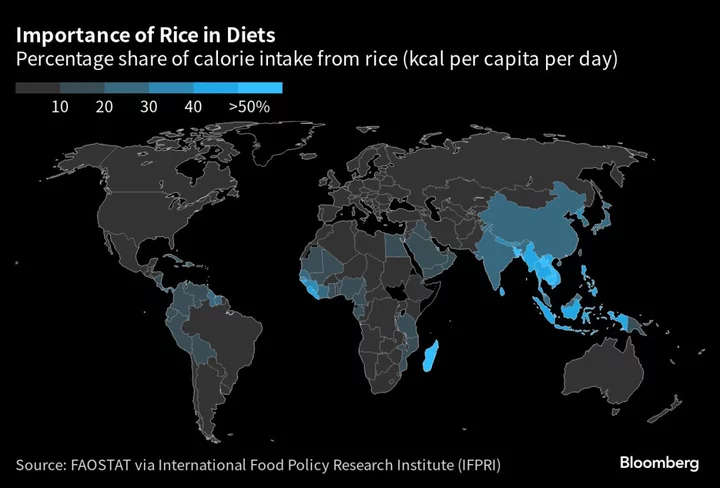South Africa hosts a summit of the BRICS group of nations and others in the Global South next week who are seeking to balance Western dominance of the world order while dealing with their own internal divisions.
At least 40 heads of state and government will join South Africa’s Cyril Ramaphosa, China’s Xi Jinping, India’s Narendra Modi and Brazil’s Luiz Inacio Lula da Silva in Johannesburg. Russian Foreign Minister Sergei Lavrov represents Vladimir Putin, who will attend virtually to avoid possible arrest for alleged war crimes if he entered the country.
Read more: How BRICS Became a Club That Others Want to Join
“When it comes to global power equations, Africa and the Global South are still outliers,” said South Africa’s BRICS ambassador Anil Sooklal. “The so-called western liberal order that was created post the Second World War don’t want to make space for new players.”
Here are five things to watch as they gather Aug. 22-24 in Sandton, the business hub in the city’s wealthy northern suburbs:
1. Expansion
Expansion from the group’s current membership of Brazil, Russia, India, China and South Africa is top of the agenda after being put on the back burner at previous summits. Formed in 2009 and with South Africa added a year later, there are now 23 other nations lining up to join including Indonesia, Saudi Arabia and Egypt.
China’s drive for rapid expansion has faced pushback from India, which fears the group could become a mouthpiece for its powerful neighbor. Brazil is also wary of alienating the West. But opposition has softened and these countries are now asking that admission rules and criteria be agreed, according to officials familiar with the discussions, speaking on condition of anonymity.
2. Common Currency
The bloc will revive the idea of reducing the dollar’s dominance in payments, mooted at previous summits. The debate has resurfaced after US interest-rate hikes and Russia’s invasion of Ukraine sent the US currency soaring, along with the cost of commodities priced in dollars.
Proposals to be considered include increasing the use of members’ national currencies to trade and setting up a common payments system. A goal to create a common currency is viewed as a longer-term project.
Read More: BRICS to Discuss Accelerated Use of Local Currencies at Summit
Several BRICS members have already begun to settle bilateral trade deals in local currencies. India has an accord with Malaysia to ramp up usage of the rupee in cross-border business. Brazil and China earlier this year struck a deal to settle trade in their local currencies and India and Russia have approached South Africa about interlinking payment settlement in their own currencies.
3. New Development Bank
Trade between BRICS members surged 56% to $422 billion over the past five years, and their collective nominal gross domestic product of $25.9 trillion equated to 25.7% of global output, data from the Higher School of Economics in Moscow show.
The New Development Bank, which would be a conduit for such transactions, has estimated that at least one third of lending will be in local currencies by 2026, Sooklal said.
The Shanghai-based lender’s President Dilma Rousseff will provide an update at the gathering on plans to diversify its funding sources. The NDB, set up as an alternative to the International Monetary Fund and World Bank in 2015, has been hampered by Western sanctions on Russia — a founding member — following its invasion of Ukraine.
There’s also desire to broaden the bank’s borrowing basket and several countries in the Middle East and elsewhere in Asia are interested in contributing capital to the NDB, Sooklal said. He added that 12 countries are looking at becoming full members.
4. Ukraine
Russia’s 18-month long invasion of Ukraine will be on the agenda. BRICS nations have mostly stuck together since the war, with only Brazil voting in favor of a February United Nations resolution calling for an end to the conflict and demanding that Russia withdraw. China, India and South Africa abstained.
Read More: BRICS Leaders to Discuss Russian War in Ukraine at August Summit
Lula has said he wants the bloc to help forge peace. South Africa is driving an African initiative to bring an end to the combat.
5. Food Security
Soaring food prices are hurting billions of the world’s poorest people and food security will be on the agenda against the backdrop of actions by India and Russia that have made the situation worse.
India — which accounts for 40% of the world’s rice trade — has ramped up export curbs to protect its local market. Russia has exited a deal to ensure the safe passage of Ukrainian grain exports, which had been a rare example of cooperation during the war.
Rice is vital to the diets of Asians and Africans, contributing as much as 60% of total calorie intake for people in these regions. India will host an India Africa Forum while in South Africa and China plans to stage a similar event of its own.
Read More: Soaring Rice Prices Stretch Budgets for Billions in Asia, Africa
“I believe both of them will make announcements including around agriculture,” Sooklal said. “I’m quite confident that some of these issues will be addressed positively.”
--With assistance from Simone Preissler Iglesias, S'thembile Cele, Sudhi Ranjan Sen, Colum Murphy and Anup Roy.

